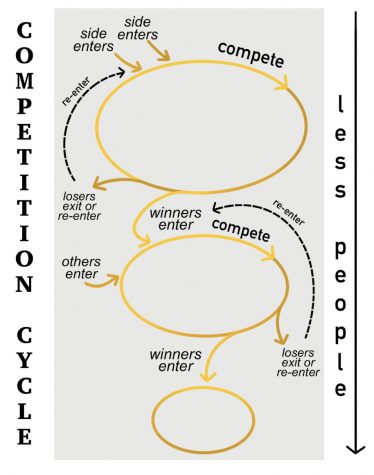Corrupt Competition Culture #1: The Other Lethal Pathogen
The first installment of Corrupt Competition Culture, exposing the issues in our society, especially in high school.
We have a disease in society, and no, I’m not talking about coronavirus. I’m referencing a pathogen whose roots dig far deeper into humankind than anyone could imagine.
Every 12 minutes in the United States, one person makes the conscious choice to take their own life. That means, for the approximate length of one class period at NAI, 4 people commit suicide. Take a moment and internalize that statistic. Think about things you can do in twelve minutes and how relatively short the span of time is. Then, ponder why it happens. It wasn’t always like this. How can something as precious as life be cast away? I can tell you that whatever caused the 44,965 Americans to take their lives last year, must be beyond the scope of comprehension. While each circumstance is different, I have the feeling that they share somewhat of a common, yet so toxic root.
Put simply, competition is when there is less of something desired than people who desire it.
Ever since the dawn of life itself, competition has existed. Initially, it was just for the necessities: food, water, mates, etc. Over time, as we developed into civilizations we moved far strides past hunter-gatherers. As such, these rewards so to speak have evolved into trophies, medals, awards, scholarships, and attention. In society, we still idolize competition through sports leagues, academic tournaments, the job market, and probably the most common throughout this series of articles, the college admissions process. The world as we know it has effectively been consumed by this eleven letter word.
For example, use the idea of a bank with the currency of sanity. Students invest their sanity into the bank by taking five or six AP classes, practically becoming mental bulimics for course content, and loading up their schedules with sports, clubs, and volunteering. As a result, 87% of high schoolers are chronically sleep deprived. All of this puts a strain on one’s mental health with the hope of somehow getting a return on investment of a college acceptance letter or prestigious job.
In truth, people go to drastic measures to ensure they can attain whatever it is they want. Maybe they try to protect a position that they have or want to get? Maybe they unintentionally hurt someone in order to gain a higher social status? Of course these are just some personal examples, yet, I’m sure when you think about it, everyone can relate. However, The question we should all be asking ourselves is why. Why has something so primitive managed to plague humans for the entirety of their history and gone unnoticed?
Logically, competition has a cyclical nature; multiple sides are competing for something that cannot be attained by all of them. As such, there will always be sides achieving their goals and sides that are not; winning and losing sides per se. Far too often, we only see the successful sides of competition, the winners of games, the celebrities in life, the relationships that work out. Despite this, though, the side of competition that no one really talks about strongly relates to two words: inadequacy and perception. Inadequacy is the feeling of being less than what is sufficient, while perception is simply how one interprets data, ideas, and concepts.
The losing side has a choice, Depending on how they perceive their “loss” they can either feel one of two ways: Empowered which leads to working harder or inadequate which leads to a variety of negative impacts. Unfortunately, the latter of the two has seemed to be the more common in recent years. For the winning sides, they just look for the next goal that they can achieve and the cycle repeats. Unfortunately, everyone has limits or a breaking point where they can’t reach any higher, and the misperception and feelings of inadequacy start to strike, and the cycle repeats.

Competition works in a cyclical nature. The final circle is always the most desireable, but the most difficult to achieve.
Think about it like a pyramid: there are multiple levels to this arbitrary hierarchy, and the higher up you go, the less people there are until you finally reach this state where you are above everyone else, but only a few ever make it that far as it comes with great cost. For the rest, they either just re-enter the cycle and attempt to reach the top, or they feel too burnt out of the competition cycle and satisfied with where they are and stay put in the “level” that they are in.
An increasing number of people however, decide that it is better not to live than to not be in this top level, or decide that if they can’t reach the top, no one should be able to. At the end of the day, one of the largest reasons mental health issues are so prevalent is because of competition in the first place. Of course, it isn’t the only factor, but something to take into account nevertheless. The sad reality is that people aren’t properly equipped with the tools they need to deal with loss. A study done by the Cohen Veterans Care Summit finds that despite 56% of Americans seeking help, there is a direct lack of access. The study further finds that one in four Americans have to choose between paying for basic necessities and mental health care.
It is at this point that we start to see how deep the roots of competition have grown into every aspect of society, especially in high school. People can’t even get access to the basic necessities for dealing with mental health issues caused by society itself. From the perspective of a student, a stable future is seemingly rare. Because of this, high schoolers go to drastic measures to attain what their perception of success is. For many, high school has become a living hell for their mental health.
Holistically, society would be to blame for the systematic weaving of such a toxic concept into life. We created this cutthroat environment where people are inherently disadvantaged. We can only blame it on ourselves, the government, and society that people have to fight for their positions to ultimately survive. It’s not a political debate of any sort, but rather an ethical issue. It’s not that people should be just handed things without working, it’s that when people work it should be rewarded accordingly. I believe that people are born with a right to solid mental health and in society today, people profit off of that right.
Summatively, I’m not sure a cure to competition will ever exist. If we eradicate it, society will practically disintegrate. If we promote it more, only worse will come. It’s an instance where people need to further develop their immune systems against competition’s symptoms of inadequacy and poor perception. How can we make sure that another 44,975 people never take their lives again when the resources to do so aren’t even available? For far too long, we have been ignoring a crisis that seems to deepen as the years pass, but is there a way we can fix it? You tell me.
Alok is a sophomore at NAI. This is his first year writing for the NAEye. His passions include soccer, cricket, economics, global politics, and computer...

Morgan Nash is a sophomore at NAI with a passion for art and design. If she's not on her iPad Pro sketching new ideas (that she flexes the discount price...

